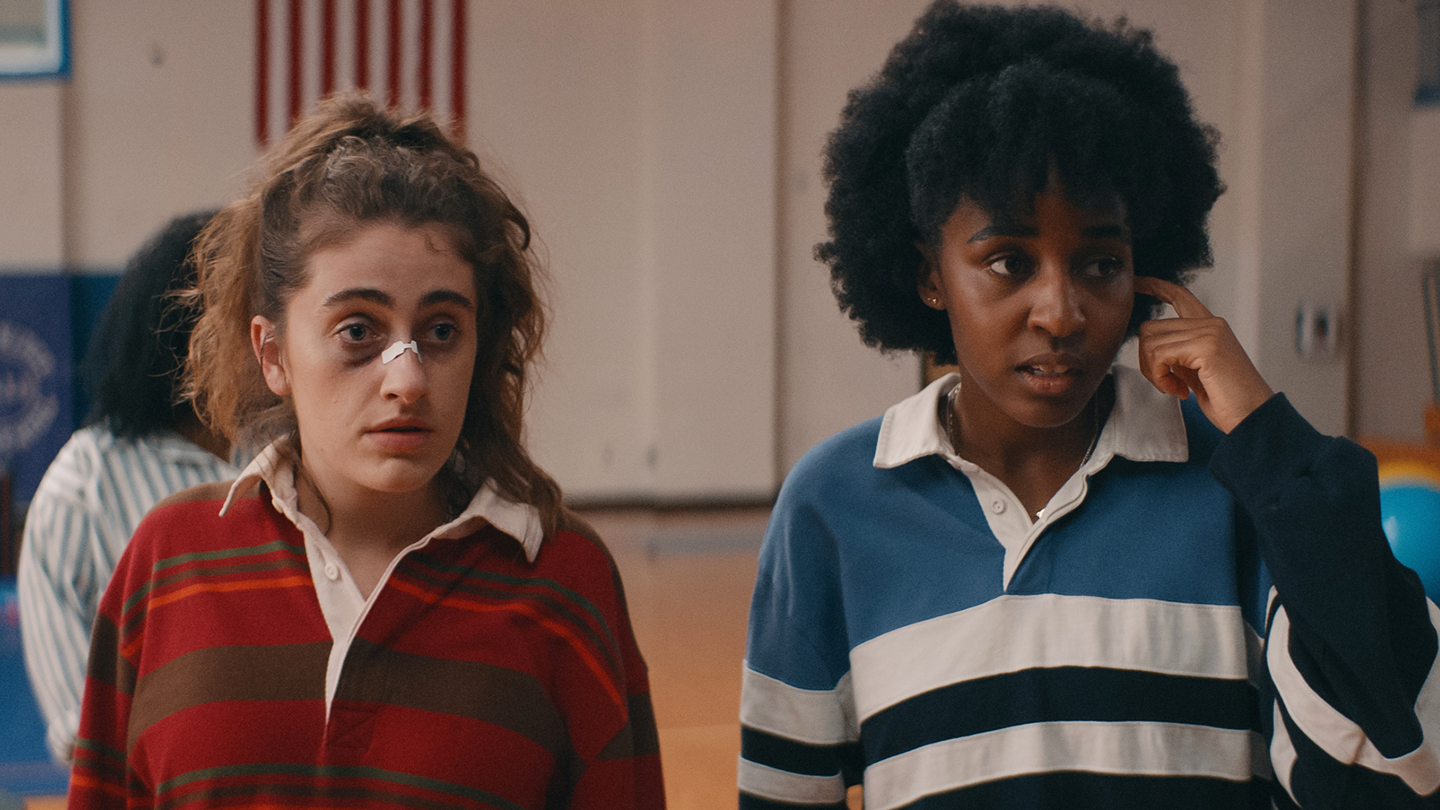It’s beginning to feel like South By Southwest is the Rachel Sennott Festival. After breaking out there three years ago with Shiva Baby (the movie premiered as a short in 2018 and would have again as a feature in 2020 if not for the pandemic), she made waves last year in Austin with sleeper horror hit Bodies Bodies Bodies. Now Sennott’s back with Bottoms, one of two new movies she’s headlining this week, and which adopts many characteristics of an SXSW offering: it’s gay, it’s bloody, and it’s horny.
At least that’s how director Emma Seligman described her sophomore feature in front of a raucous opening-night audience. But even that barely encapsulates the absurdist reality that this early-2000s high school comedy establishes and then keeps deconstructing. After collaborating on their claustrophobic chamber drama Shiva Baby, Seligman has re-teamed and co-written a joke-heavy screenplay (boasting an impressive hit rate) with Sennott, expanding her canvas into classrooms, gymnasiums, and football fields that blends satire and melodrama into functional accord. The result is a riotous affair, a lacerating and hyper-violent insult fest that pulls from Wet Hot American Summer, But I’m a Cheerleader, and Not Another Teen Movie and still manages to carve its own surrealist place in the genre’s rich pantheon.
On a narrative level, Bottoms follows the loose two-hander blueprint laid down by Superbad and Booksmart, centering two outsider best friends in their quest for a sexual encounter and higher social standing. Together, PJ (Sennot), the movie’s engine as an aggressive instigator, and Josie (Ayo Edibiri), who sweetly stammers and stumbles, set their sights on two crushes, Brittany (Kaia Gerber) and Isabel (Havana Rose Liu), respectively, and start scheming ways to get their attention––eventually in their pants. The stakes feel ludicrously monumental. This is a movie wherein football players walk through the halls in their shoulder pads and jerseys every day; insubordinate students get penned into cages in the corners of classrooms; and Jeff (Nicholas Galitzine), the star quarterback, has his own mural resembling The Creation of Adam. The closest thing to an authority figure in school is Mr. G., a history teacher with no discernible skills and improbably played by Marshawn Lynch.
When their flirtatious attempts at a back-to-school carnival go wrong, Josie barely grazes Jeff’s knee with her car. The “injury” sends the entire school district into histrionics, jeopardizing the team’s health before a game with its cross-town rivals, whose members are allegedly attacking area teenage girls. The logic is miles gone (the football team and its imposing infrastructure might as well represent the patriarchy), but Seligman trusts you to adapt expectations and go for the ride. PJ and Josie soon hatch a plan to start an all-girls fight club, an after-school opportunity to cuddle up with their crushes that can masquerade as a much-needed self-defense class. With the help of a studious and clerical friend, Hazel (Ruby Cruz), they start organizing meet-ups with no training and zero supervision.
Though the club is haphazardly conceived as a gag, both PJ and Josie quickly realize they’ve built something necessary––a supportive outlet promoting feminism and bonding between a diverse group of girls who rarely spend time sharing their problems with each other. When asked if anyone has ever been sexually assaulted, the entire circle raises its hand, and it’s clear this isn’t exactly a David Fincher movie. Isabel opens up to Josie about home life; Brittany shares insecurities around her eating disorders. Even Mr. G., who reluctantly signs on as the club’s sponsor and rolls his eyes at the feminist icons in their textbooks, can’t help but be moved by everyone’s vulnerability.
But these get-togethers aren’t just therapy sessions. Without even using mats, PJ and Josie start throwing haymakers and wrestling on the hard-wood floors, promoting and asserting an unfounded rumor they went to juvie as street cred to gain new members. The pair have different methods for their ultimate pursuits––PJ takes a linguistic blunt knife to Brittany’s hard-cracked popularity while Josie finds more success in wooing Isabel away from her boyfriend Jeff, convincing her she might have feelings for the opposite sex. The divergent personalities between these two besties provides enough dramatic friction to ground this adventure, a product of the chemistry that Sennott and Edibiri already established in their miniseries Ayo and Rachel Are Single that only grows here.
The challenge is taking it all in. Seligman has crammed so much comedy into fast-paced dialogue––Sennott is especially equipped to sling one-liners; Edibiri provides pitch-perfect hypotheticals and tangents––that you barely have time to see her visual gags erupt from the margins of the frame. If Shiva Baby exemplified the unrelenting itchiness of keeping your darkest secrets to yourself, then Bottoms is a much more ambitious antidote, tearing down conventions and gender politics while liberating sexual libidos with the reckless abandon of kick to the groin. Even in its zaniest moments––the group straps a bomb to Jeff’s parked car to punish him for sleeping with Hazel’s mom, all as Bonnie Tyler’s “Total Eclipse of the Heart” plays over top––the movie never loses its meaningful, cathartic threads.
It’s hard to remember such a dramatic directorial pivot in sensibility and storytelling as Seligman’s. She’s moved from cloistered cringe to lesbian liberation. And though you could argue Bottoms‘ bloody finale (which fittingly ends with the big game) should shatter more of the boundaries it’s already pushed, she’s leaned into her primary protagonist’s––and this festival’s––ethos well beyond expectation. What would a high school movie look like if its queer characters ended up as jock-slamming, hierarchy-upending heroes? Bottoms is this year’s righteously indignant, big-swing answer.
Bottoms premiered at SXSW 2023 and will be released by Orion Pictures via MGM.

